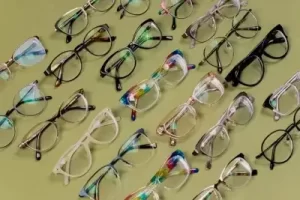
Imagine a world where blurry visions and squinting to read street signs are things of the past. A world where you can effortlessly admire intricate details, read small print with ease, and enjoy crystal-clear clarity in every aspect of your life. This is the world that awaits you when you find the perfect pair of eye glasses. With a multitude of options available, it’s essential to understand the different types of glasses and how they can enhance your vision. So whether you’re nearsighted, farsighted, or in need of multifocal lenses, get ready to embark on a journey toward clearer sight!
Navigating Vision Correction: Understanding Your Needs
Before delving into the different types of eye glasses available, it’s crucial to determine your specific vision correction needs. Each individual’s eyesight is unique, so it’s essential to consult an optometrist or ophthalmologist for a comprehensive eye exam. This examination will assess your visual acuity and identify any refractive errors such as myopia (nearsightedness), hyperopia (farsightedness), astigmatism (blurred vision), or presbyopia (difficulty focusing on close objects due to age). Armed with this knowledge, you’ll be better equipped to choose from the various types of eye glasses tailored specifically to address your visual requirements.
Single Vision Lenses: Seeing Clearly at All Distances
For those requiring correction for a single refractive error (such as myopia or hyperopia) without any additional vision challenges, single vision lenses are an ideal choice.
Myopia (Nearsightedness)
If distant objects appear blurry while nearby objects remain clear, you may have myopia. Single vision lenses designed for myopia correction ensure that faraway objects regain their sharpness, enabling you to see the world in all its intricate detail.
Hyperopia (Farsightedness)
On the other hand, if nearby objects appear blurry while distant objects remain clear, you may have hyperopia. Single vision lenses for hyperopia correction help bring nearby objects back into focus, allowing you to read and perform close-up tasks with ease.
Multifocal Lenses: A Seamless Transition Between Near and Far
For individuals who require correction for multiple vision challenges or age-related presbyopia, multifocal lenses provide a seamless transition between near and far distances without the need for switching glasses.
Bifocals
Bifocal lenses are a popular choice for those with presbyopia. These lenses consist of two distinct areas: the upper portion corrects distance vision while the lower portion caters to near vision. This design allows wearers to enjoy improved visual acuity across various distances without needing to switch glasses.
Trifocals
Trifocal lenses take multifocality a step further by incorporating an additional intermediate zone. This intermediate zone is ideal for tasks such as working at a computer or reading sheet music at arm’s length. With trifocal lenses, wearers can effortlessly shift their gaze between different focal points throughout the day.
Progressive Lenses: Effortless Adaptability
Progressive lenses offer an innovative solution for those seeking a seamless transition between different distances without visible lines on their eyeglasses.
Smooth Transitions Between Distances
Unlike bifocals or trifocals that have distinct zones, progressive lenses feature a gradual change in prescription from top to bottom. This means that wearers can effortlessly adjust their gaze within the lens area to achieve optimal clarity at any distance.
Enhanced Aesthetics
In addition to their practical benefits, progressive lenses also boast aesthetic advantages. They eliminate visible lines on eyeglasses, resulting in a more natural and youthful appearance.
Specialized Lenses: Meeting Unique Vision Needs
Beyond single vision, multifocal, and progressive lenses, there are specialized lenses available to meet unique vision needs.
Photochromic Lenses
Photochromic lenses adapt to changing light conditions, darkening when exposed to bright sunlight and returning to a clear state indoors. These lenses provide convenience and UV protection without the need for separate prescription sunglasses.
Blue Light Filtering Lenses
With the increasing prevalence of digital devices in our lives, blue light filtering lenses have gained popularity. These lenses block or filter out harmful blue light emitted by screens, reducing eye strain and potential long-term damage.
High-Index Lenses
High-index lenses are an excellent choice for individuals with high prescriptions who desire thinner and lighter glasses. Their advanced material allows for more efficient bending of light, resulting in slimmer lens profiles.
Embrace Clarity: Choosing the Right Eye Glasses for You
Selecting the right type of eye glasses is a personal journey that involves considering your visual needs, lifestyle factors, and personal preferences. Consult with your eye care professional to determine which type of glasses best suits your specific requirements. Remember, whether you opt for single vision lenses, multifocal designs, progressive options, or specialized lenses – each has its own benefits that can enhance your vision and transform how you experience the world around you.
In conclusion, understanding the different types of eye glasses empowers you to make an informed decision about your visual correction. By identifying your specific needs and exploring various options available – from single vision to multifocal or specialized designs – you can find eyeglasses that not only correct your vision but also suit your lifestyle. So go ahead and embrace clarity by discovering the perfect pair of eye glasses that will open up a world of vibrant detail and crystal-clear sight!


